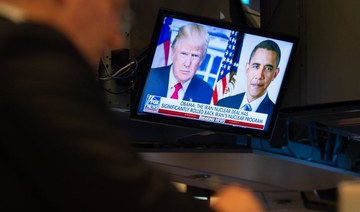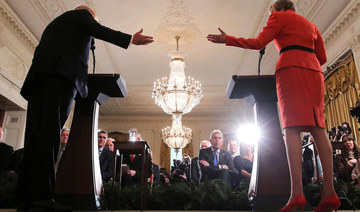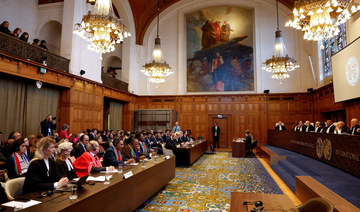WASHINGTON: Starkly injecting race into his criticism of liberal Democrats, President Donald Trump said four congresswomen of color should go back to the “broken and crime infested” countries they came from, ignoring the fact that all of the women are American citizens and three were born in the US His attack drew a searing condemnation from Democrats who labeled the remarks racist and breathtakingly divisive.
Following a familiar script, Republicans remained largely silent after Trump’s Sunday morning broadsides against the four women. But the president’s nativist tweets caused Democrats to set aside their internal rifts to rise up in a united chorus against the president.
House Speaker Nancy Pelosi said Trump wants to “make America white again.” Rep. Alexandria Ocasio-Cortez of New York, after jousting for days with Pelosi, said Trump “can’t conceive of an America that includes us.”
Trump, who has a long history of making racist remarks, was almost certainly referring to Ocasio-Cortez and her House allies in what’s become known as “the squad.” The others are Reps. Ilhan Omar of Minnesota, Ayanna Pressley of Massachusetts and Rashida Tlaib of Michigan. Only Omar, from Somalia, is foreign-born.
Ocasio-Cortez swiftly denounced his remarks . “Mr. President, the country I ‘come from,’ & the country we all swear to, is the United States,” she tweeted, adding that “You rely on a frightened America for your plunder.” Omar also addressed herself directly to Trump in a tweet, writing: “You are stoking white nationalism (because) you are angry that people like us are serving in Congress and fighting against your hate-filled agenda.”
Rep. Hakeem Jeffries of New York, chairman of the House Democratic Caucus, summed up the Democratic response: “Racial arsonist strikes again. Shut. Your. Reckless. Mouth.”
With his tweet, Trump inserted himself further into a rift between Pelosi and Ocasio-Cortez, just two days after he offered an unsolicited defense of the Democratic speaker. Pelosi has been seeking to minimize Ocasio-Cortez’s influence in the House Democratic caucus in recent days, prompting Ocasio-Cortez to accuse Pelosi of trying to marginalize women of color.
“She is not a racist,” Trump said of Pelosi on Friday.
On Sunday, Trump’s tone took a turn.
“So interesting to see ‘Progressive’ Democrat Congresswomen, who originally came from countries whose governments are a complete and total catastrophe, the worst, most corrupt and inept anywhere in the world (if they even have a functioning government at all), now loudly and viciously telling the people of the United States, the greatest and most powerful Nation on earth, how our government is to be run,” he tweeted.
“Why don’t they go back and help fix the totally broken and crime infested places from which they came. Then come back and show us how it is done.”
He added: “These places need your help badly, you can’t leave fast enough. I’m sure that Nancy Pelosi would be very happy to quickly work out free travel arrangements!“
The attacks may have been meant to widen the divides within the Democrat caucus, which has been riven by internal debate over how far left to go in countering Trump and over whether to proceed with impeachment proceedings against the president. Instead, the president’s tweets, which evoked the trope of telling black people to go back to Africa, brought Democrats together.
“Let’s be clear about what this vile comment is: A racist and xenophobic attack on Democratic congresswomen,” tweeted Sen. Elizabeth Warren, a Democratic presidential candidate.
Another 2020 contender, former Texas Rep. Beto O’Rourke, tweeted at the president: “This is racist. These congresswomen are every bit as American as you — and represent our values better than you ever will.”
Few Republicans weighed in on the president’s comments. Congressional leaders, including Senate Majority Leader Mitch McConnell, did not respond to requests for comment, nor did Sen. Tim. Scott of South Carolina, the only Republican black senator.
Mark Morgan, the acting commissioner of US Customs and Border Protection, in a previously scheduled appearance on “Face the Nation” on CBS, said only: “You’re going to have to ask the president what he means by those specific tweets.”
Shortly after the tweets, and a later presidential post defending the harsh scenes at a border detention facility where hundreds of migrant men are being held in sweltering, foul-smelling conditions, Trump left the White House to go golfing at his Virginia club.
Trump appeared unbowed Sunday night when he returned to Twitter to say it was “so sad” to see Democrats sticking up for the women. “If the Democrat Party wants to continue to condone such disgraceful behavior,” he tweeted, “then we look even more forward to seeing you at the ballot box in 2020!“
It was far from the first time that Trump has been accused of holding racist views.
In his campaign kickoff in June 2015, Trump deemed many Mexican immigrants “rapists.” In 2017, he said there good people on “both sides” of the clash in Charlottesville, Virginia, between white supremacists and anti-racist demonstrators that left one counter-protester dead. Last year, during a private White House meeting on immigration, Trump wondered why the United States was admitting so many immigrants from “shithole countries” like African nations.
Repeatedly, Trump has painted arriving immigrants as an “infestation” and he has been slow in condemning acts of violence committed by white supremacists. And he launched his political career with false claims that President Barack Obama was not born in the United States.
Despite his history of racist remarks, Trump has paid little penalty in his own party.
Though a broad array of Republicans did speak out against his reaction to Charlottesville, they have largely held their tongues otherwise, whether it be on matter of race or any other Trump provocation. Fearful of his Twitter account and sweeping popularity among Republican voters, GOP lawmakers have largely tried to ignore the provocative statements.
Sen. Kamala Harris, a Democratic presidential hopeful from California, tweeted, “Let’s call the president’s racist attack exactly what it is: un-American.”
Ocasio-Cortez, who is of Puerto Rican descent, was born in the Bronx, New York, and raised in suburban Westchester County.
Pressley, the first black woman elected to the House from Massachusetts, was born in Cincinnati.
Omar, the first Somali native elected to Congress and one of its first Muslim women, was born in Somalia but spent much of her childhood in a Kenyan refugee camp as civil war tore apart her home country. She immigrated to the United States at age 12, teaching herself English by watching American TV and eventually settling with her family in Minneapolis.
Tlaib was born in Detroit.
Trump’s tweets against liberal congresswomen called racist
Trump’s tweets against liberal congresswomen called racist
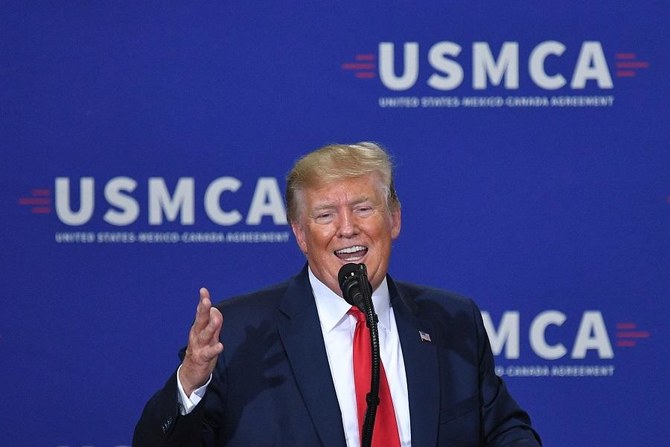
- Trump said four congresswomen of color should go back to the “broken and crime infested” countries they came from
- The attacks may have been meant to widen the divides within the Democrat caucus, which has been riven by internal debate
France charges Daesh official’s ex-wife with crimes against humanity
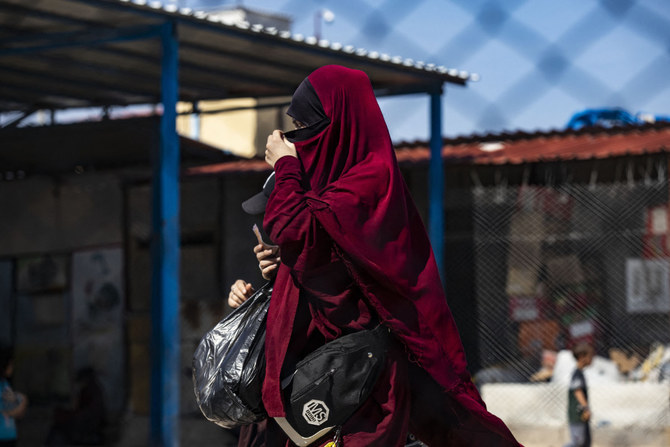
- The woman identified only as Sonia M. was accused by a Yazidi woman of raping her twice and knowing that her husband was raping her, Le Parisien reported
- The Yazidi woman was 16 when she was taken captive by Daesh militants and forced into slavery by top Daesh official Abdelnasser Benyoucef
PARIS: France has charged the ex-wife of a top Daesh official with crimes against humanity on suspicion of enslaving a teenage Yazidi girl in Syria, French media reported.
A woman identified as Sonia M., the former wife of the jihadist group’s head of external operations Abdelnasser Benyoucef, was charged on March 14, Le Parisien said Saturday.
The Yazidi woman, who was 16 when she was forced into slavery by Benyoucef, accused Sonia M. of raping her twice and knowing that her husband was raping her, the report said.
The woman, now 25, said she was held for more than a month in 2015 in Syria, where she was not allowed to eat, drink or shower without Sonia M.’s permission.
Sonia M. denied the allegations against her in a March 14 interview with French investigators, saying “only one rape” had been committed by her former husband.
The teenager “left her room freely, ate what she wanted, went to the toilet when she needed to,” she said in her interview, seen by AFP.
Sonia M.’s lawyer Nabil Boudi slammed the charges as “opportunistic accusations,” saying that prosecutors were seeking “to make her responsible for the most serious crimes, because the courts have not managed to apprehend the real perpetrators.”
An arrest warrant has been issued for Benyoucef, according to a source close to the investigation.
France launched an investigation in 2016 into genocide, crimes against humanity and war crimes committed against ethnic and religious minorities in Iraq and Syria since 2012.
The probe has focused on crimes suffered by members of the Yazidi and Christian communities as well as members of the Sheitat tribe, according to France’s PNAT anti-terror unit.
“The aim is to document these crimes and identify the French perpetrators who belong to the Islamic State organization,” PNAT told AFP.
US announces $6 billion in security aid for Ukraine
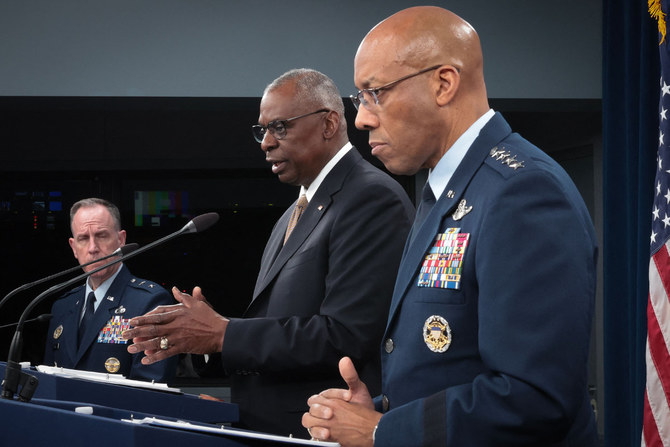
- The package is the second this week, following another valued at $1 billion
- Ukraine’s President Volodymyr Zelensky said the US delay in approving new assistance has been costly for Kyiv
WASHINGTON: Defense Secretary Lloyd Austin on Friday announced the United States will provide key air defense munitions and artillery rounds to Ukraine as part of a $6 billion military aid package that is its largest ever for Kyiv.
The package is the second this week, following another valued at $1 billion that was announced just after US President Joe Biden signed a much-delayed bill to provide new funding for Ukraine as it struggles to hold back Russian advances.
“This is the largest security assistance package that we’ve committed to date,” Austin told journalists following the conclusion of a virtual meeting of dozens of Kyiv’s international supporters.
“They need air defense interceptors, they need artillery systems and munitions. They need... armored vehicles, they need maintenance and sustainment. So all of those kinds of things are included” in the package,” he said.
Ukraine has in recent months pleaded for more air defenses from its Western allies as it struggles to fend off a surge in deadly attacks on civilian infrastructure, and the new package includes interceptors for both Patriot and NASAMS air defense systems.
But unlike the $1 billion package announced Wednesday, which featured items that will be drawn from US stocks, the latest assistance will be procured from the defense industry, meaning it will take longer to arrive on the battlefield.
Speaking at the opening of the virtual meeting, Ukraine’s President Volodymyr Zelensky said the US delay in approving new assistance has been costly for Kyiv.
“While we were waiting for a decision on the American support, the Russian army managed to seize the initiative on the battlefield,” Zelensky said.
“We can still now not only stabilize the front, but also move forward, achieving our Ukrainian goals in the war,” he said, while noting that “Ukrainian defenders need your sufficient and timely support.”
A senior US defense official said this week that “Ukrainian forces have been rationing their ammunition for quite some time, rationing their capabilities.”
Aid from the United States and other countries “will enable the Ukrainians to begin to retake the initiative,” but “this will not be a rapid process,” the official said on condition of anonymity.
“The Ukrainians will need to rebuild quite a bit to take on board all of these new supplies... and ensure that they can defend their positions. So I would not forecast any large-scale offensive in the near-term,” the official added.
The United States has been a key military backer of Ukraine, committing tens of billions of dollars in security assistance since Russia launched its full-scale invasion in February 2022.
But prior to this week, Washington had announced new aid for Ukraine on just one other occasion this year, a $300 million package in March that was only made possible by using money that the Pentagon had saved on other purchases.
A squabbling Congress had not approved large-scale funding for Kyiv for nearly a year and a half, but eventually took action starting last week after months of acrimonious debate among lawmakers over how or even whether to help Ukraine defend itself.
The US House of Representatives on April 20 approved legislation authorizing $95 billion in aid funding, including $61 billion for Ukraine, while the Senate passed the measure on Tuesday and Biden signed it into law the following day.
It’s 30 years since apartheid ended. South Africa’s celebrations are set against growing discontent

- South Africa is still the most unequal country in the world in terms of wealth distribution, according to the World Bank, with race a key factor
- While the damage of apartheid remains difficult to undo, the ANC is increasingly being blamed for South Africa’s current problems
PRETORIA: South Africa marked 30 years since the end of apartheid and the birth of its democracy with a ceremony in the capital Saturday that included a 21-gun salute and the waving of the nation’s multicolored flag.
But any sense of celebration on the momentous anniversary was set against a growing discontent with the current government.
President Cyril Ramaphosa presided over the gathering in a huge white tent in the gardens of the government buildings in Pretoria as head of state.
He also spoke as the leader of the African National Congress party, which was widely credited with liberating South Africa’s Black majority from the racist system of oppression that made the country a pariah for nearly a half-century.
The ANC has been in power ever since the first democratic, all-race election of April 27, 1994, the vote that officially ended apartheid.
But this Freedom Day holiday marking that day fell amid a poignant backdrop: Analysts and polls predict that the waning popularity of the party once led by Nelson Mandela is likely to see it lose its parliamentary majority for the first time as a new generation of South Africans make their voices heard in what might be the most important election since 1994 next month.

“Few days in the life of our nation can compare to that day, when freedom was born,” Ramaphosa said in a speech centered on the nostalgia of 1994, when Black people were allowed to vote for the first time, the once-banned ANC swept to power, and Mandela became the country’s first Black president. “South Africa changed forever. It signaled a new chapter in the history of our nation, a moment that resonated across Africa and across the world.”
“On that day, the dignity of all the people of South Africa was restored,” Ramaphosa said.
The president, who stood in front of a banner emblazoned with the word “Freedom,” also recognized the major problems South Africa still has three decades later with vast poverty and inequality, issues that will be central yet again when millions vote on May 29. Ramaphosa conceded there had been “setbacks.”
The 1994 election changed South Africa from a country where Black and other nonwhite people were denied most basic freedoms, not just the right to vote. Laws controlled where they lived, where they were allowed to go on any given day, and what jobs they could have. After apartheid fell, a constitution was adopted guaranteeing the rights of all South Africans no matter their race, religion, gender or sexuality.
But that hasn’t significantly improved the lives of millions, with South Africa’s Black majority that make up more than 80 percent of the population of 62 million still overwhelmingly affected by severe poverty.
The official unemployment rate is 32 percent, the highest in the world, and more than 60 percent for young people between the ages of 15 and 24. More than 16 million South Africans — 25 percent of the country — rely on monthly welfare grants for survival.
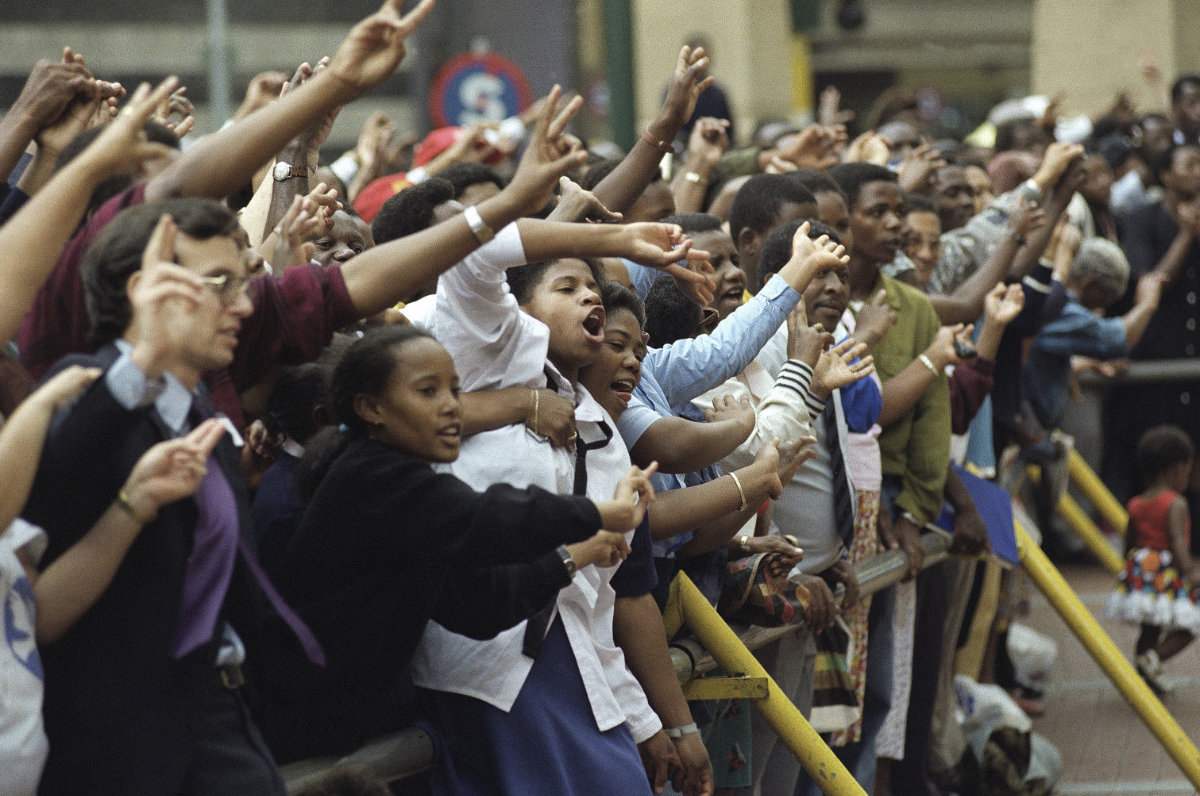
South Africa is still the most unequal country in the world in terms of wealth distribution, according to the World Bank, with race a key factor.
While the damage of apartheid remains difficult to undo, the ANC is increasingly being blamed for South Africa’s current problems.
In the week leading up to the anniversary, countless South Africans were asked what 30 years of freedom from apartheid meant to them. The dominant response was that while 1994 was a landmark moment, it’s now overshadowed by the joblessness, violent crime, corruption and near-collapse of basic services like electricity and water that plagues South Africa in 2024.
It’s also poignant that many South Africans who never experienced apartheid and are referred to as “Born Frees” are now old enough to vote.
Outside the tent where Ramaphosa spoke in front of mostly dignitaries and politicians, a group of young Black South Africans born after 1994 and who support a new political party called Rise Mzansi wore T-shirts with the words “2024 is our 1994” on them. Their message was that they were looking beyond the ANC and for another change for their future in next month’s election.
“They don’t know what happened before 1994. They don’t know,” said Seth Mazibuko, an older supporter of Rise Mzansi and a well-known anti-apartheid activist in the 1970s.
“Let us agree that we messed up,” Mazibuko said of the last 30 years, which have left the youngsters standing behind him directly impacted by the second-worst youth unemployment rate in the world behind Djibouti.
He added: “There’s a new chance in elections next month.”
US intel suggests Putin may not have ordered Navalny death in prison: WSJ
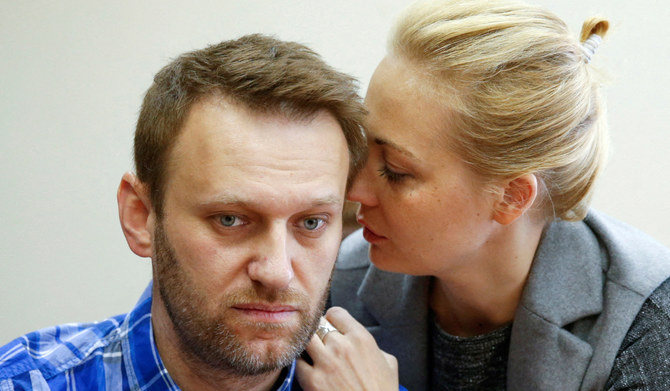
- The Russian prison service said that Navalny collapsed on February 16 after a walk at the isolated camp
WASHINGTON: US intelligence agencies believe that while the Russian president was ultimately responsible for the death of opposition leader Alexei Navalny, he didn’t order it to take place when it did, the Wall Street Journal reported Saturday.
The finding, which the Journal said was based on both classified intelligence and an analysis of public facts, raises new questions about Navalny’s death in a remote Arctic prison camp, which led to a new round of sanctions against President Vladimir Putin’s Russia.
Among those facts was the timing of the opposition leader’s death in mid-February, which overshadowed Putin’s reelection a month later.
While the new finding does not question Putin’s responsibility for Navalny’s death, the CIA and other US intelligence agencies believe he probably didn’t order it “at that moment,” the Journal said, quoting people familiar with the matter.
It said that some European officials, briefed on the US finding, were skeptical that the 47-year-old dissident could have been targeted without Putin’s prior knowledge, given the tight controls in today’s Russia.
President Joe Biden and several other world leaders have publicly expressed little doubt about the matter. “Make no mistake. Putin is responsible for Navalny’s death,” Biden said after the stunning news of the death emerged.
The Russian prison service said that Navalny collapsed on February 16 after a walk at the isolated camp. It said attempts to revive him failed.
Navalny had seemed relatively healthy and in good spirits when seen in a video just a day earlier.
A week before that, he reportedly had been the subject of high-level talks over a potential prisoner swap that could have freed him.
Navalny had been serving a 19-year prison sentence on charges he and his backers insist were fabricated.
He had earlier survived a poisoning that US and other investigators blamed on the Kremlin. Russian officials have denied culpability in the poisoning or in his death.
A number of prominent Kremlin opponents have died, been jailed and or forced into exile in recent years.
Reached by AFP, the National Security Council declined to comment on the report.
Some US officials say in internal memo Israel may be violating international law in Gaza

- The submissions to the memo provide the most extensive picture to date of the divisions inside the State Department over whether Israel might be violating international humanitarian law in Gaza
WASHINGTON: Some senior US officials have advised Secretary of State Antony Blinken that they do not find “credible or reliable” Israel’s assurances that it is using US-supplied weapons in accordance with international humanitarian law, according to an internal State Department memo reviewed by Reuters.
Other officials upheld support for Israel’s representation.
Under a National Security Memorandum (NSM) issued by President Joe Biden in February, Blinken must report to Congress by May 8 whether he finds credible Israel’s assurances that its use of US weapons does not violate US or international law.
By March 24, at least seven State Department bureaus had sent in their contributions to an initial “options memo” to Blinken. Parts of the memo, which has not been previously reported, were classified.
The submissions to the memo provide the most extensive picture to date of the divisions inside the State Department over whether Israel might be violating international humanitarian law in Gaza.
“Some components in the department favored accepting Israel’s assurances, some favored rejecting them and some took no position,” a US official said.
A joint submission from four bureaus — Democracy Human Rights & Labor; Population, Refugees and Migration; Global Criminal Justice and International Organization Affairs – raised “serious concern over non-compliance” with international humanitarian law during Israel’s prosecution of the Gaza war.
The assessment from the four bureaus said Israel’s assurances were “neither credible nor reliable.” It cited eight examples of Israeli military actions that the officials said raise “serious questions” about potential violations of international humanitarian law.
These included repeatedly striking protected sites and civilian infrastructure; “unconscionably high levels of civilian harm to military advantage“; taking little action to investigate violations or to hold to account those responsible for significant civilian harm and “killing humanitarian workers and journalists at an unprecedented rate.”
The assessment from the four bureaus also cited 11 instances of Israeli military actions the officials said “arbitrarily restrict humanitarian aid,” including rejecting entire trucks of aid due to a single “dual-use” item, “artificial” limitations on inspections as well as repeated attacks on humanitarian sites that should not be hit.
Another submission to the memo reviewed by Reuters, from the bureau of Political and Military Affairs, which deals with US military assistance and arms transfers, warned Blinken that suspending US weapons would limit Israel’s ability to meet potential threats outside its airspace and require Washington to re-evaluate “all ongoing and future sales to other countries in the region.”
Any suspension of US arms sales would invite “provocations” by Iran and aligned militias, the bureau said in its submission, illustrating the push-and-pull inside the department as it prepares to report to Congress.
The submission did not directly address Israel’s assurances.
Inputs to the memo from the Office of the Special Envoy to Monitor and Combat Antisemitism and US ambassador to Israel Jack Lew said they assessed Israel’s assurances as credible and reliable, a second US official told Reuters.
The State Department’s legal bureau, known as the Office of the Legal Adviser, “did not take a substantive position” on the credibility of Israel’s assurances, a source familiar with the matter said.
State Department spokesperson Matthew Miller said the agency doesn’t comment on leaked documents.
“On complex issues, the Secretary often hears a diverse range of views from within the Department, and he takes all of those views into consideration,” Miller said.
MAY 8 REPORT TO CONGRESS
When asked about the memo, an Israeli official said: “Israel is fully committed to its commitments and their implementation, among them the assurances given to the US government.”
The White House did not respond to a request for comment.
Biden administration officials repeatedly have said they have not found Israel in violation of international law.
Blinken has seen all of the bureau assessments about Israel’s pledges, the second US official said.
Matthew Miller on March 25 said the department received the pledges. However, the State Department is not expected to render its complete assessment of credibility until the May 8 report to Congress.
Further deliberations between the department’s bureaus are underway ahead of the report’s deadline, the US official said.
USAID also provided input to the memo. “The killing of nearly 32,000 people, of which the GOI (Government of Israel) itself assesses roughly two-thirds are civilian, may well amount to a violation of the international humanitarian law requirement,” USAID officials wrote in the submission.
USAID does not comment on leaked documents, a USAID spokesperson said.
The warnings about Israel’s possible breaches of international humanitarian law made by some senior State Department officials come as Israel is vowing to launch a military offensive into Rafah, the southern-most pocket of the Gaza Strip that is home to over a million people displaced by the war, despite repeated warnings from Washington not to do so.
Israel’s military conduct has come under increasing scrutiny as its forces have killed 34,000 Palestinians in Gaza, according to the enclave’s health authorities, most of them women and children.
Israel’s assault was launched in response to the Hamas attack on Israel on Oct. 7, in which Israel says 1,200 people were killed and 250 others taken hostage.
The National Security Memorandum was issued in early February after Democratic lawmakers began questioning whether Israel was abiding by international law.
The memorandum imposed no new legal requirements but asked the State Department to demand written assurances from countries receiving US-funded weapons that they are not violating international humanitarian law or blocking US humanitarian assistance.
It also required the administration to submit an annual report to Congress to assess whether countries are adhering to international law and not impeding the flow of humanitarian aid.
If Israel’s assurances are called into question, Biden would have the option to “remediate” the situation through actions ranging from seeking fresh assurances to suspending further US weapons transfers, according to the memorandum.
Biden can suspend or put conditions on US weapons transfers at any time.
He has so far resisted calls from rights groups, left-leaning Democrats and Arab American groups to do so.
But earlier this month he threatened for the first time to put conditions on the transfer of US weapons to Israel, if it does not take concrete steps to improve the dire humanitarian situation in Gaza.



